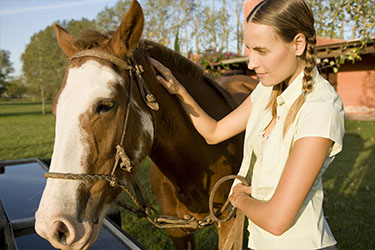Veterinarian Tips: Equine West Nile Virus

Summer is nearly here! The time to talk to clients about horses, biting mosquitos, and West Nile virus is now!
West Nile disease poses a continuing threat to the equine population. The following information may prove useful when talking to clients about this mosquito-borne disease:
How does a horse contract the West Nile virus?
A bird-borne disease that has its highest infection rates occurring from late summer into fall, the West Nile virus is transmitted as follows:
- Infected birds carry high levels of the disease pathogen in their blood
- A healthy mosquito lands on and bites a bird that is a carrier of the West Nile virus
- As the mosquito takes its meal, it becomes infected by the pathogens in the bird’s blood
- The now-infected mosquito lands on and bites a healthy horse
- The West Nile disease pathogens are transmitted to the horse through the bite wound.
What happens to the horse once it becomes infected?
The incubation period of West Nile disease averages between 3 to 15 days. Once the virus is transmitted, it will:
- Begin to multiply in the animal’s blood system
- Cross the blood-brain barrier to infect the brain
- Interfere with the animal’s central nervous system, resulting in brain inflammation.
What are the symptoms of West Nile disease?
The following list is comprised of the symptoms that have been observed in infected animals. While not all animals that become infected have clinical signs, most will show one or more, including:
- Most common symptom: Loss of coordination and stumbling
- Loss of appetite
- Depression
- Apprehension
- Hypersensitivity
- Excitability
- Muscle weakness, particularly of the hind limbs
- Muscle trembling
- Falling down
- Animal may become recumbent and be unable to rise
- Flaccid paralysis of the lower lip, giving it a droopy lip
- Muzzle twitching
- Inability to swallow
- Teeth grinding
- Fever
- Head pressing
- Excessive sweating
- Appears disoriented, wanders aimlessly
- Circling
- Convulsions
- Blindness
- Total paralysis.
If an animal is observed with these signs, what should be done?
If any of the described signs are observed, clients need to know to contact their veterinarian immediately. They also should be advised that it is difficult to positively diagnose West Nile disease based on observations alone, as other serious diseases have similar symptoms, including:
- Rabies
- Equine herpes virus-1
- Botulism
- Bacterial meningitis
- Wobbler syndrome.
To make a positive identification of West Nile disease, further testing will need to be done to confirm that the animal has recently been exposed to the virus.
Can a horse die from West Nile disease?
If the infection is so severe that the animal will not recover, euthanasia may need to be considered.
What type of treatments are available?
There is no specified treatment plan for this disease. Veterinarians will often provide supportive care through the use of:
- Non-steroidal anti-inflammatory drugs (NSAIDs)
- Steroids.
Are there any steps to take to prevent West Nile disease?
Veterinarians can help clients reduce the risk of disease by:
- Vaccinating the horse against the West Nile virus
- Developing or reviewing the animal’s overall wellness plan, looking closely for ways to strengthen the animal through nutrition and supplements.
Client can apply farm management procedures that work to remove the environment used by mosquitoes for breeding and egg-laying, implementing tasks that include:
- Routine emptying and cleaning out any water buckets, troughs, or pet water bowls every few days
- Checking automated watering systems to ensure they are functioning properly and are free of mosquito larvae
- Keeping all unused items such as buckets, pans, wheelbarrows, and wading pools turned over so they can’t catch and hold water
- Drilling holes in the bottoms of containers that are not meant to hold water or that can’t easily be emptied
- Cleaning outbuilding gutters and downspouts to keep them free of debris and standing water
- Preventing standing water by grading and tiling fields
- Eliminating any unnecessary areas of pooling water in pastures and/or in manure holding areas
- Discarding trash that could collect and hold water, such as unused tires
- Keeping swimming pools clean and chlorinated when not in use
- Aerating or stocking fish in ornamental pools or water gardens.
Stable management practices can also be put in place to help reduce exposure, such as:
- Eliminating bird roosting areas in and around the stables
- Applying a topical treatment that repels mosquitoes on the horses
- Using a product that repels mosquitoes in the stable.
Clients can seek additional help to assess their property’s risk of exposure by contacting their county:
- Extension office
- Department of Environmental Protection
- Department of Health.
Unfortunately, horses are susceptible to the West Nile virus. Helping clients understand how the infection is transmitted, as well as pointing out the steps they can take to prevent the spread of the disease may help to reduce their animal’s risk for exposure.
Contact your Covetrus representative to learn more about helping clients to keep their horses healthy online or at 855.724.3461.
Sources:
https://tvmdl.tamu.edu/2013/06/17/west-nile-virus-in-horses-diagnostic-guidance-for-veterinarians/
http:/www.westnile.state.pa.us/animals/horses.htm


Working Here
Our team members are encouraged to be the best they can be... at Covetrus we believe we impact one another.
Learn MoreNews & Events
FDA Cautions Pet Owners Not to Feed Texas Tripe Inc. Raw Pet Food Due to Salmonella, Listeria Monocytogenes
The U.S. Food and Drug Administration is cautioning pet owners not to feed their pets any of the Texas Tripe brand raw frozen pet food listed below because several samples of Texas Tripe raw pet food have tested positive for Salmonella and/or L. mono.
Careers
Are you looking for a place to let your talents shine? At Covetrus, we help our practitioner customers better serve their patients and take pride in providing the best customer experience possible. Search our open positions to see our available opportunities.
Newsletter
Stay current with what’s going on with Covetrus, subscribe to receive our newsletter and email communications. Subscribers will receive the latest information in practice management, sales and marketing, animal health, and more.



-3-(1).png?sfvrsn=2d806d73_0)

Leave a comment